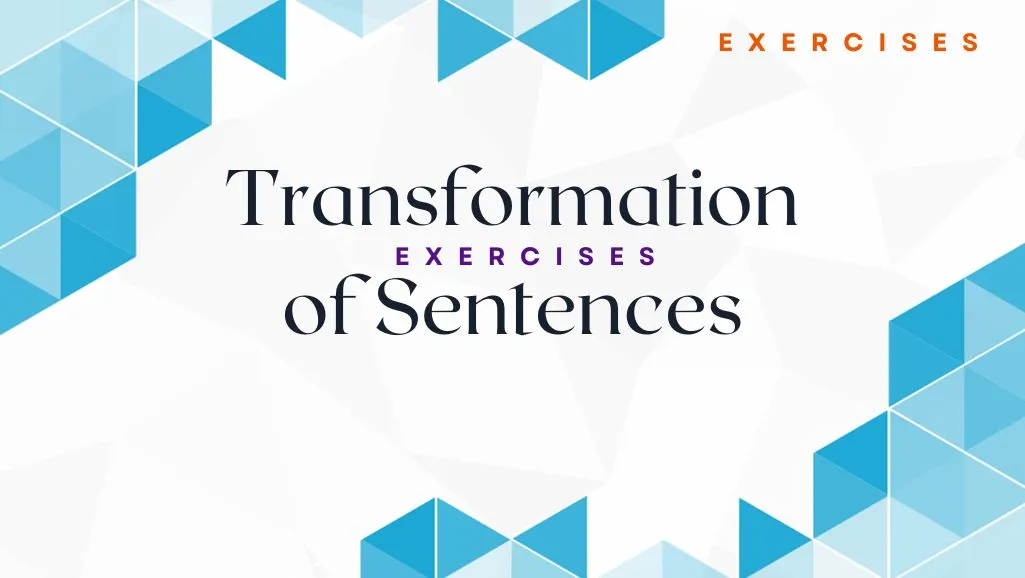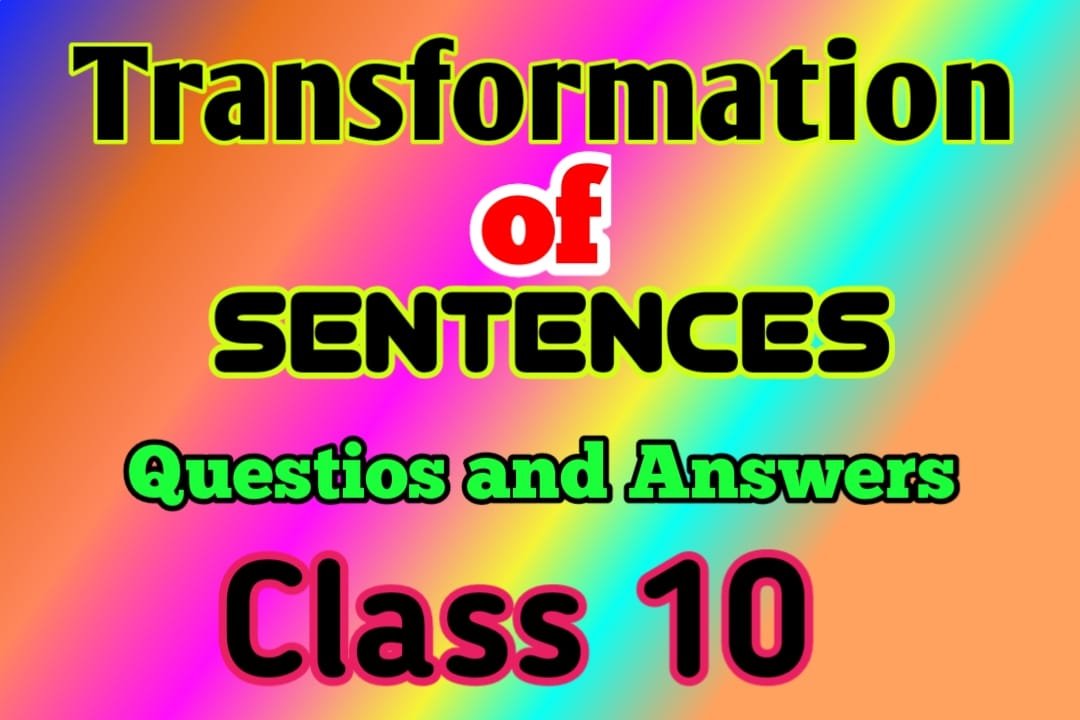Welcome to the world of Transformation of Sentences Exercises! Transformation of Sentences involves changing the form, structure, or type of sentences while retaining the original meaning.
In this comprehensive guide, we will delve into the fascinating realm of sentence transformation exercises, providing you with insights, tips, and techniques.
Exercises 1: Transformation of Sentences
Negative to Affirmative sentences and vice versa.
Q. Transform the following sentences from Negative to Affirmative sentences and vice versa.
1. None doubts his honesty.
2. Only a fool dares to do this.
3. Everybody will admit that he did his best.
4. He cares very little for what you say.
5. He hates you.
6. Learned men are not always judicious.
7. None but a coward would flee from his duty.
8. She is not taller than you.
9. Everyone wishes to be happy.
10. He is more industrious than I.
11. He speaks so low that he cannot be heard.
12. All men must die. 13. He reads only English
14. You must obey your elders.
15. He is illiterate.
16. We should overlook a printer’s errors.
17. He is the oldest man in the village.
18. Jenner was now certain of his ground.
19. Please remember me.
20. Only the brave can do it.
People also ask
Exercises 2:
Interrogative to Assertive sentences and vice versa.
Q. Transform the following interrogative Sentences (Questions) into Assertive (Statements)
1. Everybody hates a coward.
2. Who can bear such an insult?
3. Who can forget those happy days?
4. Was he not a villain to do such a deed?
5. Who doesn’t love a good boy?
6. Everyone would flee from a state of bondage.
7. Fair words are of no avail in the time of danger.
8. No one ever saw a brighter daybreak than this.
9. Who does not feel for a man in distress?
10. The paths of glory lead but to the grave.
11. Can a dead man be brought to life?
12. Can we ever forget his services to the country?
13. Who does not wish to be happy?
14. Virtue is its own reward.
15. Does the sun move around the earth?
16. Why waste time in useless pursuits?
17. Does anything succeed like success?
18. Are you ill?
19. Are you not my friend, my son?
Exercises 3:
Exclamatory to Assertive sentences and vice versa.
Q. Transform the following sentences from Exclamatory to Assertive (Statement) and vice versa:
1. O, that the desert were my dwelling place!
2. How sad was the sight of the deserted city!
3. How merrily the bird sings!
4. Ah, what a sight was there!
5. I wish I had the wings of a dove.
6. It is very stupid of me to forget your name.
7. She leads a very unhappy life.
8. It is a terrible country to belong to.
9. What a piece of work is man!
10. How cold you are!
11. It is a horrible sight.
12. I cry shame on your treachery.
13. What a wonderful sight I have seen!
14. Oh, that I were safe at home!
People also ask
Exercises 4:
Simple into Complex sentences.
Hints: A Simple Sentence can be converted to a Complex one by expanding a word or phrase into a Subordinate Clause. This Subordinate Clause may be a Noun, Adjective or Adverb Clause.
Noun Clause
Q. Transform each of the following Simple Sentences into a Complex one containing a
Noun Clause:
1. He is generally believed to have died of poison.
2. No one can tell the time of his departure.
3. I intend to go to Kolkata.
4. We’ve heard of his failure.
5. He pleaded ignorance of the law.
6. The result was his total ruin.
7. He is not likely to be punished.
8. Father wishes me to do Honours in Chemistry.
9. Always tell the truth.
10. He is confident of his success.
11. I believe in his honesty.
Adjective(Relative) Clause
Q. Transform each of the following Simple Sentences into a Complex one containing
an Adjective (Relative) Clause:
1. He was the last boy to reach there.
2. We saw a pathetic scene.
3. Egypt was the first country to be civilized.
4. I saw a blind man.
5. He was not a man to tell a lie
6. Satish Babu is the wisest man in our village.
7. This is my house.
8. Gour, once the capital of Bengal, is now in ruins.
9. That was an insult not to be forgotten.
10. He looked at the setting sun.
11. It was a large lovely garden with soft green grass.
Adverb Clause
Q. Convert each of the following sentences into a Complex one containing an Adverb Clause:
1. He worked day and night to prosper in life.
2. We took shelter in an inn after sunset.
3. He was too poor to help us.
4. The day is too hot to go out.
5. She is too lazy to get on in life.
6. In spite of his poverty he was honest.
7. He failed in life because of his pride.
8. The work is too difficult to be done.
9. Wait here till my arrival.
10. The train left the station before our arrival.
11. We eat to live.
12. With moonrise we resumed our work.
13. He was sorry on finding out his mistake.
14. Shila is the dullest of all the girls in the class.
Exercises 5:
Complex into Simple sentences.
Hints: A complex Sentence can be converted to a Simple one by converting the Noun Clause, Adjective Clause (ing/ed/to, etc.), and Adverb Clause into a phrase or a word.
Noun Clause
Q. Convert the following Complex sentences to Simple ones, by changing the Noun clauses :
1. I do not know where he was born.
2. He told me what his name was.
3. He reported that the man had died.
4. He confessed that he had committed the crime.
5. Can you make out what he says?
6. I pray that he may be successful in life.
7. I believe that he is innocent.
8. It is reported that he has stood first in the examination.
9. That he is clever is admitted by all.
10. I know what his intention is.
Adjective ( Relative) Clause
Q. Convert the following Complex sentences to Simple ones, by changing the Adjective clauses :
1. Have you forgotten what I gave you?
2. He did not get the letter that I wrote to him.
3. Only those boys who are industrious can shine in life.
4. We must love those who live near us.
5. This is the place where he was born.
6. I have nothing that I can do.
7. The power that money gives is great.
8. He has no friend to whom he can go.
9. He was the last man who went there.
10. They soon forget the labors they had endured.
Adverb Clause
Q. Convert the following Complex sentences to Simple ones, by changing the Adverb clauses :
1. He acted as a wise man does.
2. I would have died if you had not helped me.
3. As he was ill, he did not attend school that day.
4. You can never succeed unless you work hard.
5. He came after I had left the meeting.
6. Though he is poor, he is honest.
7. He was so excited that he could not speak.
8. I am so tired that I cannot walk.
9. He is pleased that you have succeeded.
10. He was astonished when he got the news.
Exercises 6:
Simple into Compound sentences.
Hints: A Simple Sentence can be transformed into a Compound sentence by enlarging a word or a phrase into a Co-ordinate Clause.
Q. Rewrite the following Simple Sentences as Compound ones:
1. Seeing a bear the traveller climbed a tree.
2. The work being done, we returned home.
3. Besides advising them he helped them with money.
4. He walks two hours a day to keep his body fit.
5. He hated everyone but himself.
6. Putting on his hat he went outside.
7. In spite of his riches he is unhappy.
8. The weather being fine, we went for a walk.
9. Besides being a teacher he is a social worker.
10. In spite of his poverty he is honest.
Transformation of Sentences Exercises 7:
Compound into Simple sentences.
Hints: A Compound Sentence may be changed to a Simple one by retaining one of the clauses and substituting a Gerund, a Participle, an Infinitive or a Phrase for each of the other causes.
Q. Rewrite the following Compound Sentences as Simple ones:
1. Her friends came and she went for a walk.
2. He was very tired and so he sat down under a shady tree.
3. You must work, or you will not get a promotion.
4. We must work or we cannot get on in life.
5. He has an unpleasant duty, and he must do it.
6. The ship sank and its passengers were drowned.
7. Mr. Roy was out of town and therefore he could not attend the meeting.
8. He not only pitied him, but also relieved him.
9. We must walk fast or we shall miss the train.
10. The boy did this and so offended his father.
Transformation of Sentences Exercises 8:
Complex into Compound Sentences.
Hints: In transforming a Complex Sentence to a Compound one, the Principal clause should generally be placed last and the Subordinate Clause (which now becomes a Co-ordinate Clause) should be placed first.
Q. Transform the following Complex sentences into Compound ones:
1. He does not know that God protects us all.
2. As soon as he got your telegram. he set off.
3. If you don’t hurry, you will miss the train.
4. When the moon rose, we resumed our journey.
5. We read that we may pass the examination.
6. He succeeded at last, because he persevered in his efforts.
7. Unless you work hard, you will fail in life.
8. It is well known that mosquitoes cause malaria.
9. She has found her husband she lost in the crowd.
10. I’m glad that she reads hard nowadays.
Transformation of Sentences Exercises 9:
Compound into Complex Sentences.
Hints: In a Compound Sentence the second of the two Co-ordinate Clauses is the one which completes the sense, and is therefore the more important of the two. Hence in transforming a Compound Sentence to a Complex one the second clause should be made the Principal and the first the Subordinate.
Q. Rewrite the following Compound Sentences as Complex ones:
1. Keep quiet or you will be punished.
2. Work hard and you will succeed.
3. The boat sank, but the passengers were saved.
4. He was a poor man, but he always acted honestly.
5. The boy saw the wolf and cried for help.
6. The snake was wounded but not killed.
7. She must weep or she will die.
8. He is a liar and therefore I dislike him.
9. Advance another step and you will be captured.
10. Persevere in your attempts or you will fail.
11. Either she or her brothers are guilty.
12. The girls saw the snake and at once fled from the place.
13. Do your duty and I shall be happy.
Transformation of Sentences Exercises 10:
Interchange of the Degrees of Comparison
1. Rabindranath is the greatest poet of modern India. (Use the Comparative and the Positive Degree of the adjective).
2. Vikramaditya was the greatest judge in history. (Rewrite in the Comparative and the Positive Degree)
3. Platinum is as heavy as gold. (Use the Comparative Degree of the adjective)
4. Kolkata is one of the most populous cities in the world. (Rewrite in the Comparative and the Positive Degree)
5. Health is better than wealth. (Use the Positive Degree of the adjective)
6. Asok was one of the greatest of Indian kings. (Use the Comparative and the Positive Degree of the adjective)
7. Bad health is a more terrible enemy than poverty. (Use the Positive Degree the adjective)
8. Some countries are at least as hot as India. (Rewrite in the Comparative and the Superlative Degree)
9. He is the most intelligent boy in the class. (Use the Comparative and the Positive Degree of the adjective)
10. Babar was one of the best of Moghul emperors. (Use the Comparative and the Positive Degree
11. Very few metals are as heavy as gold. (Use the Comparative and Superlative Degree)
12. A live ass is stronger than a dead lion. (Rewrite in the Positive Degree)
13. He is in no respect superior to you. (Use the Positive Degree of the adjective!
14. It’s better to starve than to beg. (Use the Positive Degree)
Transformation of Sentences Exercises 11:
Interchange of Parts of Speech
(Use nouns for italicised words.)
1. He acted prudently.
2. They differ from each other.
3. He replied quickly.
4. It is not likely that he will fail.
5. The way to live long is to keep regular habits.
6. The journey was not expensive.
7. He fought bravely.
8. This costs ten rupees.
9. Though poor, he is honest.
10. He is strong enough to do
FAQs (Frequently Asked Questions)
How can I start practicing sentence transformation?
Begin with simple exercises and gradually move to more complex ones. Start by transforming affirmative sentences into negative ones and vice versa.
Are there any online resources for sentence transformation exercises?
Yes, there are many websites and books dedicated to sentence transformation exercises. Some popular choices include Grammarly, Khan Academy, and various grammar textbooks.
Can I use sentence transformation in creative writing?
Absolutely! Sentence transformation can add depth and creativity to your storytelling. Experiment with different transformations to make your narratives more compelling.
How can I measure my progress in sentence transformation?
Keep a journal of your transformed sentences, and periodically review them. You’ll notice improvements in your writing style and creativity over time.
Are there any common mistakes to avoid in sentence transformation?
Yes, common mistakes include altering the original meaning, creating awkward sentences, or overusing complex transformations. Practice and self-editing can help you avoid these pitfalls.
Is sentence transformation essential for professional writing?
Sentence transformation is a valuable skill for all types of writing, from academic papers to marketing copy. It adds versatility to your writing style and can make your content more persuasive.
Conclusion
In conclusion, the Transformation of Sentences Exercises is your gateway to becoming a proficient writer. By mastering the art of sentence transformation, you can elevate your writing to new levels of creativity and effectiveness. Embrace variation, practice regularly, and watch your writing skills flourish. Start your journey today and transform your words into literary magic!







